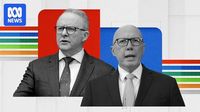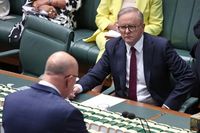As the countdown to Australia’s federal election on May 3, 2025, intensifies, Prime Minister Anthony Albanese and Opposition Leader Peter Dutton are set to face off in a high-stakes debate tonight. Hosted by 7NEWS, the final showdown will take place at 8 PM AEST from the Election Central studios in Sydney and will be broadcast live on Seven, 7plus, and 7NEWS.com.au.
The debate, moderated by 7NEWS Political Editor Mark Riley and hosted by Sunrise’s Natalie Barr, is expected to be a pivotal moment for voters. Anthony De Ceglie, Seven Network’s Director of News and Current Affairs, emphasized its significance, stating, “This final debate comes at a critical moment — just six days out from polling day — and 7NEWS is proud to bring it live to viewers.”
Both leaders will have a structured format to engage with each other and the audience. The debate will last for one hour, allowing each candidate one uninterrupted minute for their opening and closing statements. A 30-second countdown timer will be displayed on-screen to maintain the pace of the discussion. The debate will focus on six key questions directed at each leader, followed by a rapid-fire round where they will provide quick yes/no or short answers.
Viewer-submitted questions will also be included, showcasing concerns from the electorate. Each leader will have one minute to respond to each of the first six questions, with the order of responses rotating for fairness. A four-minute face-off will allow them to directly challenge each other on critical issues without interruptions.
Mark Riley remarked, “It will be the most important night of this campaign — the candidates’ last chance before polling day to convince voters why they should lead the country.” Following the debate, Michael Usher will anchor a special edition of 7NEWS Spotlight, providing analysis and feedback from a studio audience of undecided voters.
As the debate approaches, both leaders are making their final campaign pitches. Albanese has been vocal about the Labor Party’s commitment to building a future for Australians, stating, “This campaign has exposed the Coalition has not been ready for government.” He noted that voters have a real choice between “building Australia’s future or a darker, meaner, nastier reboot of the past.”
In contrast, Dutton has been focusing on economic management and the cost of living, emphasizing the struggles many families face. He stated, “We live in the best country in the world but we do know that many families are doing it tough.” Dutton has promised to cut fuel excise and provide tax rebates to alleviate financial pressures on households.
Housing affordability has emerged as a central theme in their discussions. Albanese has proposed measures to support first home buyers, allowing them to access a 5% deposit, which he believes will make an “enormous difference.” However, Dutton criticized this approach, arguing that the current government’s immigration policies have exacerbated the housing crisis, stating, “It looks like a nightmare” for many Australians struggling with rising rents.
The debate comes at a time when early voting has already begun, with over 2.1 million Australians having cast their ballots. This early voting trend could influence the dynamics of the debate, as a significant portion of the electorate has already made their decisions.
Amid the ongoing campaign, former Prime Minister John Howard has also weighed in, criticizing Albanese’s leadership. Speaking at a Liberal Party event in Mackellar, Howard stated, “I don’t want my country governed for another three years by someone who is out of his depth.” His remarks echo the sentiments of many in the Liberal Party who are rallying to regain lost ground in key electorates.
As the election date approaches, both parties are ramping up their efforts to sway undecided voters. Dutton has admitted that the Coalition is “in the fight of our lives” and is determined to reclaim seats lost in the previous election. He believes there are still opportunities to connect with voters, particularly in areas where dissatisfaction with the current government is palpable.
Albanese, on the other hand, is focused on reinforcing his party’s achievements and presenting a vision for the future. He has highlighted Labor’s plans for healthcare, education, and economic growth, promising to deliver a government that prioritizes the needs of everyday Australians.
With the final debate set to unfold, the stakes could not be higher for both leaders. As they prepare to make their cases to the nation, the outcome of this debate may very well influence the final decisions of voters heading to the polls next Saturday.
In summary, tonight’s debate is not just a formality; it represents a crucial moment in the election campaign, where both leaders will have the opportunity to articulate their visions and respond to the pressing concerns of the electorate. As Australians gear up for the polls, the debate will undoubtedly play a significant role in shaping the political landscape for the next three years.





